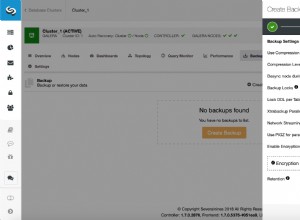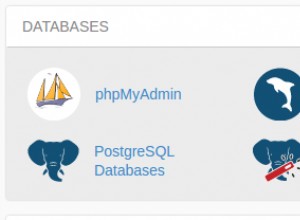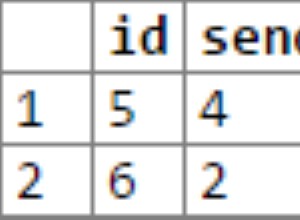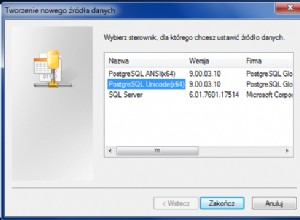Potresti avvolgere qualcosa come DotNetCoords in una funzione SQL CLR per farlo.
Vedi qui:- https://www.doogal.co.uk/dotnetcoords.php
L'ho avvolto in una funzione CLR per convertire le coordinate da Easting/Northing a Lat/Long che penso sia quello che stai chiedendo. Una volta implementata la funzione CLR, è una pura soluzione SQL (cioè puoi eseguirla tutta in una stored procedure o in una vista).
MODIFICA :Pubblicherò del codice di esempio qui sopra quando sarò al lavoro domani, spero che possa essere d'aiuto.
MODIFICA :Dovrai scaricare il codice sorgente da https://www.doogal.co. uk/dotnetcoords.php e avrai bisogno di Visual Studio per aprirlo e modificarlo. La documentazione per la biblioteca è qui https://www.doogal.co.uk/Help /Indice.html
Quello che puoi fare quindi è aggiungere una nuova classe ai file di origine in modo simile a questo:-
using System;
using System.Collections;
using System.Collections.Generic;
using System.Data.SqlTypes;
using DotNetCoords;
using Microsoft.SqlServer.Server;
/// <summary>
/// Sql Server CLR functions for the DotNetCoords library.
/// </summary>
public class CLRFunctions
{
/// <summary>
/// Coordinateses the enumerable.
/// </summary>
/// <param name="Easting">The easting.</param>
/// <param name="Northing">The northing.</param>
/// <returns></returns>
private static IEnumerable<OSRef> CoordinatesEnumerable(double Easting, double Northing)
{
return new List<OSRef> { new OSRef(Easting,Northing) };
}
/// <summary>
/// Toes the lat long.
/// </summary>
/// <param name="Easting">The easting.</param>
/// <param name="Northing">The northing.</param>
/// <returns></returns>
[SqlFunction(FillRowMethodName = "FillRow")]
public static IEnumerable ToLatLong(double Easting, double Northing)
{
return CoordinatesEnumerable(Easting, Northing);
}
/// <summary>
/// Fills the row.
/// </summary>
/// <param name="obj">The obj.</param>
/// <param name="Lat">The lat.</param>
/// <param name="Long">The long.</param>
private static void FillRow(Object obj, out SqlDouble Lat, out SqlDouble Long)
{
OSRef Coordinates = (OSRef)obj;
LatLng latlong = Coordinates.ToLatLng();
latlong.ToWGS84();
Lat = new SqlDouble(latlong.Latitude);
Long = new SqlDouble(latlong.Longitude);
}
}
Dovrai quindi creare e importare l'assembly in SQL Server (sostituire i percorsi con le tue posizioni) (per qualche motivo non riesco a far installare l'assembly quando PERMISSION_SET è "SAFE", quindi lo ordinerei prima di installarlo in un ambiente di produzione ).
CREATE ASSEMBLY DotNetCoords
FROM N'C:\Projects\DotNetCoords\bin\Debug\DotNetCoords.dll'
WITH PERMISSION_SET = UNSAFE
GO
Dovrai quindi creare una funzione SQL Server per interfacciarsi con la funzione CLR:-
CREATE FUNCTION dbo.ToLatLong(@Easting float, @Northing float)
RETURNS TABLE
(Latitude float null, Longitude float null) with execute as caller
AS
EXTERNAL NAME [DotNetCoords].[CLRFunctions].[ToLatLong]
Questa è la funzione CLR installata allora.
Dovresti quindi essere in grado di chiamare la funzione direttamente da SQL Server per eseguire la conversione (anche io ho confuso i numeri in questo post per mantenere l'anonimato, quindi potrebbero non avere senso qui, ma la funzione funziona correttamente).
/*------------------------
SELECT Latitude, Longitude FROM dbo.ToLatLong(327262, 357394)
------------------------*/
Latitude Longitude
52.13413530182533 -9.34267170569508
(1 row(s) affected)
Per utilizzarlo in un set di risultati è necessario utilizzare la clausola CROSS APPLY:-
/*------------------------
SELECT TOP 2 a.[Column 0] AS osaddessp,
a.[Column 9] AS east,
a.[Column 10] AS north,
c.[Latitude] AS lat,
c.[Longitude] AS long
FROM MyTable AS a CROSS APPLY ToLatLong (a.[Column 9], a.[Column 10]) AS c;
------------------------*/
osaddessp east north lat long
100134385607 327862 334794 52.3434530182533 -2.19342342569508
100123433149 780268 353406 52.3453417606796 -3.19252323679263
(10 row(s) affected)




